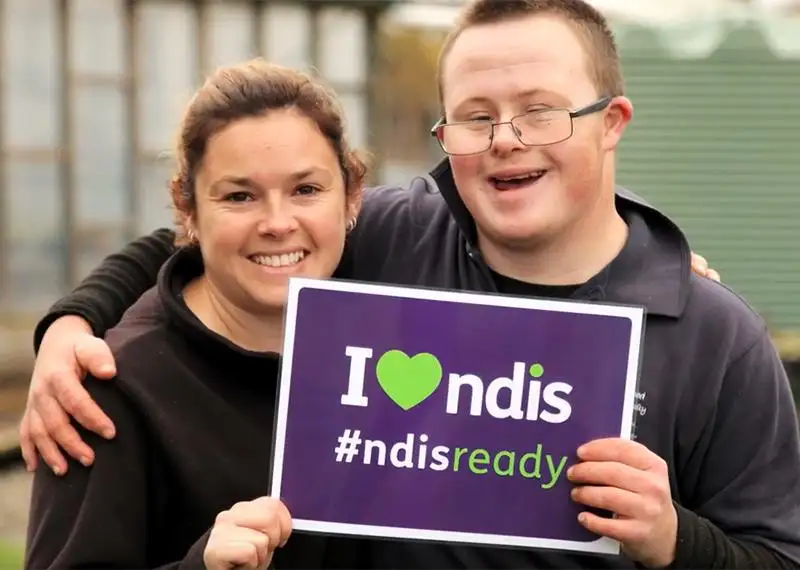How to Become an NDIS Provider in Australia: Complete 2025 Guide
Becoming an NDIS provider in Australia offers significant opportunities to make a meaningful impact in the disability sector while building a sustainable business. For a broader look at the entire journey, you might want to read our guide on starting an NDIS business from scratch. This comprehensive guide covers everything you need to know about how to become an NDIS provider, including registration costs, audit requirements, and the complete application process for 2025.
Key Points: Becoming an NDIS Provider
- NDIS provider registration is mandatory to deliver funded supports to participants
- Registration costs range from $3,000 to $50,000+ depending on provider type and supports
- The application process typically takes 3-6 months from submission to approval
- Audit costs add $15,000-$100,000+ to total registration expenses
- Ongoing compliance requirements include annual audits and quality reporting
Get a cost estimate: Use our free NDIS Provider Registration Cost Calculator to estimate your total registration costs based on your specific situation.
Understanding NDIS Provider Registration
What is NDIS Provider Registration?
NDIS provider registration is the mandatory process that organizations must complete to deliver supports and services to NDIS participants. The National Disability Insurance Agency (NDIA) oversees this registration process to ensure all providers meet quality and safety standards.
Types of NDIS Provider Registration:
- Sole Trader Registration: Individual practitioners providing direct services
- Company Registration: Incorporated businesses delivering NDIS supports
- Partnership Registration: Business partnerships providing NDIS services
- Not-for-Profit Registration: Charitable organizations and NGOs
Why Become an NDIS Provider?
Business Opportunities:
- Access to $35+ billion annual NDIS market
- Growing demand for disability services across Australia
- Stable government funding through participant plans
- Opportunity to make meaningful social impact
- Diverse service delivery options and specializations
Market Growth:
- Over 610,000 active NDIS participants (2025)
- Projected growth to 670,000 participants by 2030
- Increasing plan values and support funding
- Expansion into new geographic areas
- Growing awareness and acceptance of disability services
NDIS Registration Cost Breakdown 2025
For a more detailed analysis of the expenses involved, please see our dedicated NDIS provider registration costs guide.
Application Fees by Provider Type
Individual/Sole Trader NDIS Registration Costs:
- Application fee: $3,000 - $5,000
- Audit costs: $15,000 - $25,000
- Documentation preparation: $2,000 - $5,000
- Total estimated cost: $20,000 - $35,000
Small to Medium Organization Registration:
- Application fee: $5,000 - $15,000
- Audit costs: $25,000 - $50,000
- Policy development: $5,000 - $15,000
- Staff training and certification: $3,000 - $10,000
- Total estimated cost: $38,000 - $90,000
Large Organization Registration:
- Application fee: $15,000 - $25,000
- Comprehensive audit: $50,000 - $100,000+
- Systems and process development: $15,000 - $30,000
- Multi-site compliance: $10,000 - $25,000
- Total estimated cost: $90,000 - $180,000+
NDIS Audit Cost Components
Certification Audit Costs:
- Desktop audit: $15,000 - $25,000
- On-site audit: $25,000 - $50,000
- Multi-site audit: $50,000 - $100,000+
- High-risk supports audit: $75,000 - $150,000+
Ongoing Audit Requirements:
- Annual surveillance audits: $8,000 - $20,000
- Mid-term audits: $15,000 - $35,000
- Re-certification audits: $20,000 - $60,000
Additional Audit Costs:
- Travel and accommodation for auditors
- Staff time for audit preparation and participation
- Corrective action implementation
- External consultant support
Step-by-Step Guide: How to Become an NDIS Provider
Step 1: Determine Your Provider Type and Supports
Choose Your Registration Category:
- Core Supports: Daily activities, transport, consumables
- Capacity Building: Improved daily living, social participation, employment
- Capital Supports: Assistive technology, home modifications, SDA
Once registered, you’ll need to understand the NDIS pricing framework. Our NDIS Price Guide provides a complete overview of the rates and line items.
Specialization Options:
- Personal care and support
- Community participation
- Therapeutic supports
- Behavior support
- Supported independent living (SIL)
- Short-term accommodation (STA)
- Specialist disability accommodation (SDA)
Step 2: Understand Registration Requirements
Mandatory Requirements for All Providers:
- Australian Business Number (ABN)
- Appropriate business structure and registration
- Public liability insurance ($20 million minimum)
- Professional indemnity insurance
- Workers’ compensation insurance - learn more about if NDIS providers need insurance here
- NDIS Worker Screening for all staff
Additional Requirements by Support Type:
- High-risk supports: Enhanced background checks, specialized training
- SIL/STA providers: 24/7 support capabilities, incident management
- Therapeutic supports: Qualified allied health professionals
- Behavior support: Positive behavior support training
Step 3: Develop Policies and Procedures
Core Policy Requirements:
- Quality Management System: ISO 9001 or equivalent
- Incident Management: Reporting, investigation, prevention
- Complaints Management: Resolution processes and timeframes
- Human Resources: Recruitment, training, performance management
- Risk Management: Identification, assessment, mitigation strategies
Specialized Policies by Support Type:
- Medication management: For personal care providers
- Restrictive practices: For behavior support providers
- Food safety: For meal preparation services
- Transport safety: For community access providers
Step 4: Prepare Your Application
For a more granular look at this stage, refer to our NDIS provider application process guide.
Required Documentation:
- Application form: Complete NDIS provider application
- Business information: ABN, company structure, key personnel
- Insurance certificates: Current and adequate coverage
- Policy manual: Comprehensive policies and procedures
- Staff qualifications: Relevant training and certifications
- Financial information: Business viability and sustainability
Application Preparation Timeline:
- Months 1-2: Policy development and documentation
- Month 3: Staff recruitment and training
- Month 4: Application compilation and review
- Month 5: Application submission
- Months 6-8: Assessment and audit process
Step 5: Complete the Audit Process
Pre-Audit Preparation:
- Document review: Ensure all policies are current and compliant
- Staff training: Prepare team for audit interviews
- System testing: Verify all processes are operational
- Mock audit: Internal review to identify gaps
Audit Process:
- Desktop review: Auditor examines documentation
- On-site visit: Physical inspection and staff interviews
- Participant interviews: Feedback from current service users
- Corrective actions: Address any non-conformances identified
Step 6: Maintain Registration and Compliance
Ongoing Requirements:
- Annual surveillance audits: Maintain certification
- Quality reporting: Submit required data to NDIA
- Incident reporting: Report serious incidents within 24 hours
- Staff screening: Maintain current worker screening checks
- Insurance renewal: Ensure continuous coverage
NDIS Provider Application Support Services
Professional Support Options
NDIS Registration Consultants:
- Application preparation: Expert guidance through process
- Policy development: Customized policies and procedures
- Audit preparation: Training and mock audits
- Ongoing compliance: Continuous support and monitoring
Typical Consultant Costs:
- Full-service support: $15,000 - $50,000
- Application assistance: $5,000 - $15,000
- Policy development: $3,000 - $10,000
- Audit preparation: $2,000 - $8,000
Legal and Professional Services
Essential Professional Support:
- Legal advice: Business structure, contracts, compliance
- Accounting services: Financial management, tax obligations
- Insurance brokers: Appropriate coverage at competitive rates
- HR consultants: Staff policies, recruitment, training
Common Challenges and How to Overcome Them
Application Delays and Rejections
Common Issues:
- Incomplete documentation
- Inadequate policies and procedures
- Insufficient staff qualifications
- Poor financial viability demonstration
Solutions:
- Engage experienced consultants early
- Allow adequate preparation time
- Invest in comprehensive policy development
- Demonstrate strong business planning
Audit Failures
Common Audit Issues:
- Non-conforming policies
- Inadequate staff training
- Poor record keeping
- Insufficient risk management
Prevention Strategies:
- Regular internal audits
- Continuous staff training
- Robust documentation systems
- Proactive risk management
Financial Planning for NDIS Provider Registration
Initial Investment Requirements
Minimum Startup Costs:
- Registration and audit fees: $20,000 - $100,000+
- Insurance premiums: $5,000 - $20,000 annually
- Staff recruitment and training: $10,000 - $30,000
- Equipment and technology: $5,000 - $25,000
- Working capital: $50,000 - $200,000
Revenue Projections
Typical Provider Revenue Streams:
- Core supports: $35-65 per hour
- Capacity building: $75-200+ per hour
- Capital supports: Varies by project
Profit Margins:
- Small providers: 10-15%
- Medium providers: 15-20%
- Large providers: 20-25%+
Conclusion
Becoming an NDIS provider is a complex but rewarding process. By understanding the registration requirements, costs, and ongoing compliance obligations, you can successfully establish and grow your NDIS business. With proper planning and expert support, you can navigate the challenges and build a sustainable organization that makes a real difference in the lives of people with disability.
Frequently Asked Questions
How long does it take to become a registered NDIS provider?
The NDIS provider registration process typically takes 3-6 months from application submission to final approval, including the audit process.
How much does it cost to become an NDIS provider?
The total cost to become an NDIS provider can range from $20,000 for a sole trader to over $180,000 for a large organization, including application fees, audit costs, policy development, and insurance.
Do all NDIS providers need to be audited?
Yes, all registered NDIS providers must undergo an audit to verify compliance with the NDIS Practice Standards. The scope and cost of the audit vary based on the provider’s size and the types of supports offered.
Can I become an NDIS provider without qualifications?
While some entry-level support roles do not require formal qualifications, registering as an NDIS provider typically requires demonstrated experience, relevant certifications for specialized supports, and robust policies and procedures.
What insurance do I need to be an NDIS provider?
At a minimum, NDIS providers must have public liability insurance, professional indemnity insurance, and workers’ compensation insurance. The required coverage levels depend on the services provided.
How do I find my first NDIS clients?
Once registered, you can find clients by listing your services on the NDIS Provider Finder portal, networking with Support Coordinators and Local Area Coordinators (LACs), marketing through social media and local community groups, and building a professional website.
What are the ongoing compliance costs for an NDIS provider?
Ongoing compliance costs for NDIS providers include annual surveillance audits ($8,000 - $20,000), insurance renewals ($5,000 - $20,000+ annually), continuous professional development for staff, and maintaining up-to-date worker screening checks.
Ready to start your NDIS provider journey? Contact experienced registration consultants, develop your business plan, and begin the rewarding process of becoming an NDIS provider in Australia.


